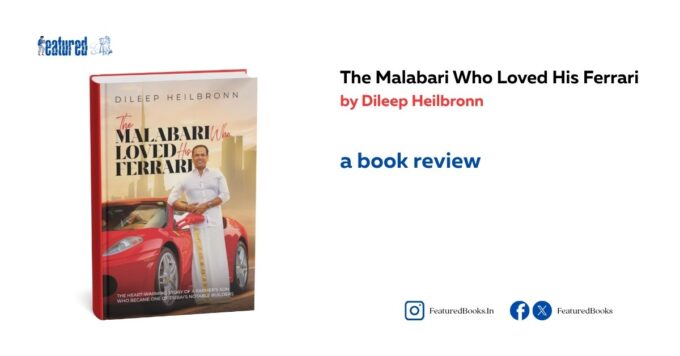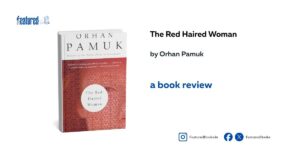Dileep Heilbronn’s memoir The Malabari Who Loved His Ferrari is neither a self-indulgent celebration of personal success nor merely an account of upward mobility in the Gulf dreamscape. Instead, it is an emotionally intelligent, reflective, and remarkably grounded documentation of a man’s journey across cities, cultures, and crises. Spanning four distinctive sections — The Early Years, Bombay Beckons, Dubai, My Love, and The Heart Matters — the book transcends the boundaries of autobiography. It enters the terrain of shared human experience. Its appeal lies not in the luxury car referenced in the title, but in the author’s ability to juxtapose material milestones with the subtle poignancies of relationships, losses, and reunions. At its core, the book is an exploration of the soul behind the success, the silence behind the applause, and the enduring humility behind towering skyscrapers.
Heilbronn writes with the lucidity of someone who has lived each moment twice — once in experience, and then again in reflection. The initial sections, particularly Made in Madras and Dream it, you can achieve it, are a tribute to the modest beginnings that often precede grand narratives. The reader is invited to witness the innocence of early aspirations and the quiet but firm resolve to break the mould. These formative years do not merely serve as a prologue to success; they provide the moral and emotional framework that undergirds the rest of the journey. There is no attempt to romanticise poverty or struggle, but neither is there bitterness. One of the first striking quotes — “bound for Dubai — poor in cash, but rich in dreams” — reflects a recurring tone of restrained optimism. That duality between limited means and limitless hope becomes the emotional axis around which the entire narrative revolves.
The chapter ‘To Dubai with $10’ is arguably one of the most resonant parts of the memoir. In this single event — a young man departing from Bombay with a mere ten dollars and a head full of dreams — the author captures the emotional weight of ambition and the loneliness of migration. The reader feels the ache of departure and the excitement of arrival. “I bowed down to Dubai, my dreamland. I touched the tarmac,” he writes, fusing reverence with realism. This is not a Dubai of fantasy but a living, pulsating city that tests every nerve of the newcomer. The city, however, becomes a mentor in itself. “Dubai was a classroom and every day brought a new lesson,” he notes. In such statements, one senses that the success which followed was not sudden or serendipitous but born of a daily submission to learning, adaptation, and unrelenting effort. The memoir thus becomes a lesson in resilience and the importance of developing virtues such as punctuality, humility, and the ability to listen — values that are often overlooked in contemporary narratives of instant success.
What elevates the book beyond a personal tale of prosperity is its unwavering emotional core. The chapter Heart-rending Times draws attention to the paradoxes of achievement. Despite his rising professional graph, the author had to contend with personal ruptures, notably the dissolution of his marriage. Yet, he handles this deeply sensitive episode with remarkable dignity. Years later, when he receives a handwritten letter from his ex-wife, expressing gratitude and asking him to be named as a nominee on her assets, he chooses not to respond directly. Instead, he allows his sons to convey his wishes, which include their financial care for her if needed and their continued maintenance of the respect he has consistently upheld for her. In an era where memoirs often slide into accusatory territories, this choice stands out as a mark of grace. “Children learn values by observing their parents,” he notes, distilling decades of maturity into a single line. Such reflections form the emotional substratum of the book, lending it a generational relevance that younger readers would do well to absorb.
A recurring theme in the latter chapters is the author’s evolving understanding of wealth. By the time the reader arrives at the section that describes his Emirates Hills residence, built by his own company in just 18 months, one expects a tone of boastful achievement. But Dileep defies that expectation. The house, while architecturally splendid with its theatre room, snooker room, play area, swimming pool, and even a spacious bathroom with glass walls, is not presented as a symbol of opulence. Instead, it is framed as a culmination of effort, memory, and sentiment. It is a space where his children can thrive and where he can pause to reflect. The coincidences of house numbers matching his school and college roll numbers are noted not to impress but to suggest a pattern, perhaps even providence. Gautam, his elder son, expresses pride in the home, offering a touching moment of generational validation. In that moment, the reader sees not just the father who built a house, but the man who built a home.
The book gains its narrative heft through the inclusion of numerous reunions and reconnections. One such deeply emotional instance is the reappearance of Pramod, a school friend who had been lost for three decades. The author’s concern for him, despite Pramod’s long silence and earlier withdrawal due to business failures and debt, is emblematic of his larger philosophy — that time should not erode affection and that help, when offered genuinely, is not conditional on the past. Their meeting, after thirty years, becomes more than a reunion. It is a testament to the belief that people matter more than events. Similarly, his emotional meeting with Kuttettan — an old roommate from Mumbai days who had only ever seen The Oberoi from outside — is a rare narrative of fulfilment. Dileep’s gesture of gifting him a cheque, which allowed him to buy back a pawned gold chain and finally step inside the hotel, feels like the closure of a karmic loop. When Kuttettan calls him “the luckiest man” he’s ever met, the reader is prompted to reconsider the definition of luck — perhaps it lies not in accumulation but in generosity, not in arrival but in remembrance.
Memory, in this memoir, is not a passive recollection of facts. It is a living entity, constantly engaging with the present. The 2022 trip to Mumbai with MJ is one of the most affecting episodes in this regard. Revisiting the ruins of the Ganesh Housing Society, the once-bustling railway stations, and the Flora building, the author walks through his past not as a tourist but as a witness to his becoming. MJ, his companion, not only sees these sites but senses the pulse of his former struggles. These recollections are more than nostalgic detours. They help locate success within a web of relationships, reminders, and regrets. This journey into the past is punctuated by Dileep’s desire to reconnect with those who shaped him. Some, like Maniyettan and Sudha Chechi, are still part of his life. Others, like Babu and Prakash, are mourned. A few, like Gopi and Anil, remain lost but not forgotten. The sincerity of these accounts speaks to the book’s deeper moral: that the weight of relationships is heavier than the shine of trophies.
The father-son dynamic is handled with maturity and emotional subtlety. His elder son Gautam, choosing to study and work part-time in Dubai instead of opting for London, is seen as a mirror of Dileep’s beginnings. The pride the author expresses is not rooted in control but in respect. Gautam’s care for his younger brother and his work ethic earn his father’s admiration. Instead of pressing him towards inheritance, Dileep urges his son to outdo his managers and strive for excellence, drawing from nature to explain survival and success. It is this balance between freedom and guidance, ambition and humility, that lends the parenting passages in the book a rare authenticity. Dileep’s belief that children should build their successes rather than relying on inheritance is echoed by his broader economic philosophy — that hoarded wealth stagnates, while circulated wealth empowers. It is a perspective that resists both indulgence and austerity, instead proposing responsibility as the middle path.
What ultimately sets The Malabari Who Loved His Ferrari apart is its affective honesty. The book does not pretend that the journey was linear or easy. It does not shy away from tears, missteps, or detours. But it does insist that every chapter of one’s life contributes to a story that is worth telling, not only for the self but for others. “Our life experiences and memories are our greatest teachers,” he writes. This line could very well be the epigraph to the entire memoir. In his closing reflections, Dileep expresses gratitude not only to family and friends but also to rivals and strangers — an inclusive vision that recognises life as a collaborative act. He wishes to relive every moment, every relationship, every trial, even those that ended in grief. The proceeds of the book, he informs us, will go to charity. In doing so, the narrative extends beyond the page into purposeful action, reinforcing the author’s commitment to using personal narrative as a tool for communal upliftment.
In conclusion, The Malabari Who Loved His Ferrari is not simply the story of a man who made it big. It is the testament of a man who never lost sight of what truly matters — connection, compassion, and continuity. With a narrative rich in detail, reflective in tone, and generous in spirit, Dileep Heilbronn offers a book that is not just to be read, but to be remembered. In his own words, “It is my fervent hope that these words serve as a source of inspiration.” They do — and in ways far more profound than even he might have imagined.
Get a copy from Amazon India – click here.
Review by Ravi for Featured Books
..
The Malabari Who Loved His Ferrari by Dileep Heilbronn, a book review
- Featured Book Rating
Summary
Raw and unpolished… the author has told his story as it is. The honesty makes him a good narrator, and his story is inspiring. A memoir worth your time.





